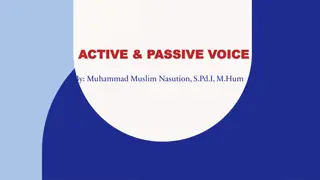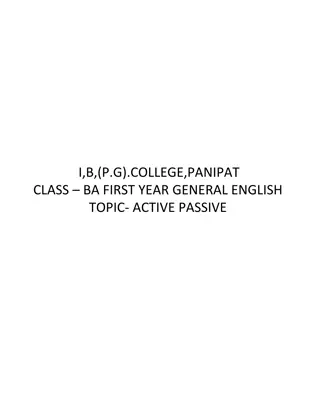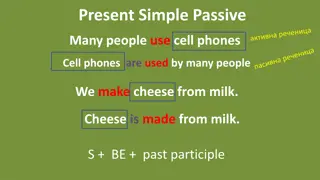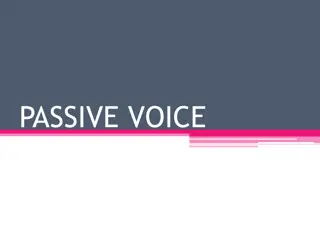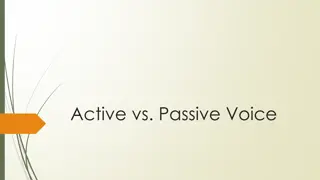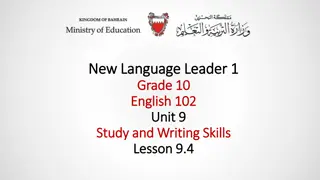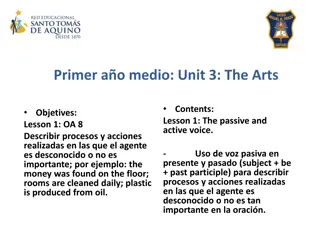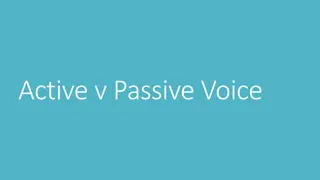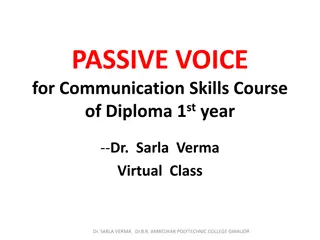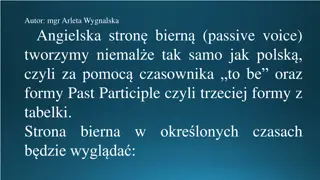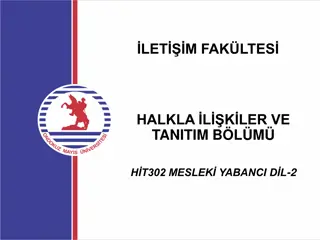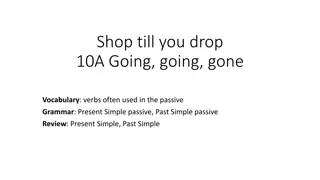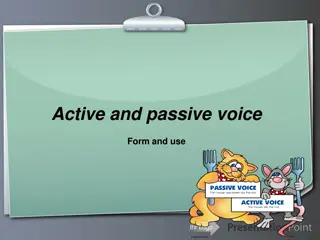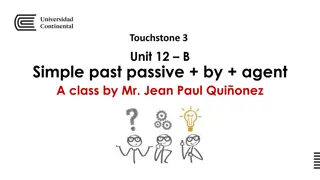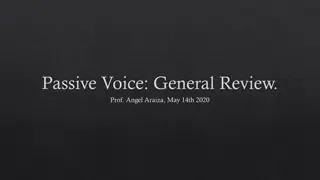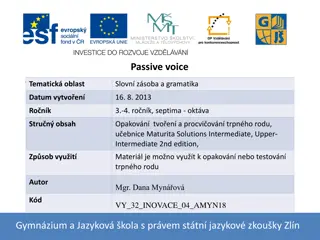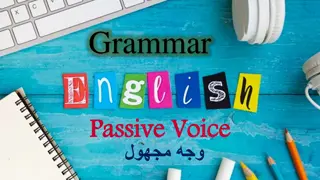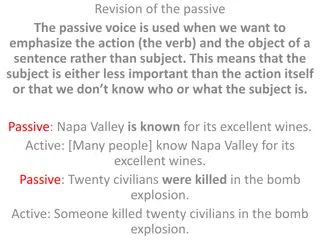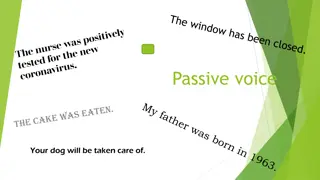
Understanding Passive Voice: Formation and Examples
Learn about Passive Voice, how to create passive sentences, and examples in Simple Present, Simple Past, and Future Tense. Understand when and how to use Passive Voice effectively to shift focus from the doer to the action itself.
Download Presentation

Please find below an Image/Link to download the presentation.
The content on the website is provided AS IS for your information and personal use only. It may not be sold, licensed, or shared on other websites without obtaining consent from the author. If you encounter any issues during the download, it is possible that the publisher has removed the file from their server.
You are allowed to download the files provided on this website for personal or commercial use, subject to the condition that they are used lawfully. All files are the property of their respective owners.
The content on the website is provided AS IS for your information and personal use only. It may not be sold, licensed, or shared on other websites without obtaining consent from the author.
E N D
Presentation Transcript
Whats Passive Voice? We use Passive when we are more interested in the action itself than the doer (the agent) of the action. My dad washes the car every weekend. (active sentence) S O The car is washed by my dad every weekend.(passive sentence) If we want to mention the agent we need to use the word BY
How to create a passive sentence? 1. Name the object(which becomes the subject) 2. Substitute the active verb with the verb TO BE in the same tense 3. Add the Past Participle (third column/ed ending) of the active verb 4. If the agent is necessary or important , put BY and the name of the agent 5. Finish the sentence
Simple Present Tense Verb TO BE AM, IS, ARE + John collects the money. The money IS COLLECTED by John. - We don t clean our rooms. Our rooms AREN T CLEANED. ? Does Mary sells fruit? IS fruit SOLD by Mary?
Examples: 1. You don t write the letter. The letter is not (isn t) written. 2. MrJones watches films. Films are watched by MrJones. 3. The policemen help children. The children are helped by the policemen. 4. Does mother water the flowers? Are the flowers watered by mother? 5. Do you take photos? Are the photos taken by you?
Simple Past Tense Verb TO BE WAS/WERE + She bought four apples. Four apples WERE BOUGHT. -My grandmother didn t tell good stories. Good stories WEREN T TOLD by my grandmother. ? Did you write the letter? WAS the letter WRITTEN by you?
Examples: 1.Tom and Max ate five hamburgers. Five hamburgers were eaten by Tom and Max. 2. People destroyed twenty books at the city library last month. Twenty books were destroyed at the city library last month. 3. Did you find a wallet on the street yesterday? Was the wallet found on the street yesterday? 4. They didn t watch the football match yesterday. The football match wasn t watched yesterday.
Future Tense-Will Verb TO BE WILL BE +Somebody will clean the office later. The office WILL BE CLEANED later. -Tom won t buy a new bike. A new bike WON T BE BOUGHT by Tom. ? Will they finish the new stadium on time? WILL the new stadium BE FINISHED on time?
Examples: 1. The birds will eat those cookies. Those cookies will be eaten by the birds. 2. The next earthquake will destroy the city. The city will be destroyed by the next earthquake. 3. Will he pick up the kids tomorrow? Will the kids be picked up tomorrow? 4. They won t polish the wooden floor. The wooden floor won t be polished.
Present Perfect Simple Verb TO BE HAS/HAVE BEEN + The little boy has broken the glass. The glass HAS BEEN BROKEN by the little boy. ? Has Ben kept the secret? HAS the secret BEEN kept by Ben? They haven t done the homework. The homework HAVEN T BEEN DONE.
Exercises: 1. He has just finished the report. The report has just been finished. 2. They haven t cleaned the kitchen yet. The kitchen hasn t been cleaned yet. 3. Have the robbers opened the safe? Has the safe been opened by the robbers? 4. I have bought a new phone. A new phone has been bought.
Exercises: 1. 2. 3. 4. 5. 6. 7. 8. The piano is played every day. His uncle was driven by Tom to the hospital last night. Is the thief caught by the policeman? This novel wasn t written by an American writer. The keys will be left under the door mat. Their new song won t be sung by the band at the concert. Has the present been received? The championship has been won by our team. She plays the piano every day. Tom drove his uncle to the hospital last night. Does the policeman catch the thief? An American writer didn t write this novel. I will leave the keys under the door mat. The band won t sing their new song at the concert. Have you received the present? Our team has won the championship.


